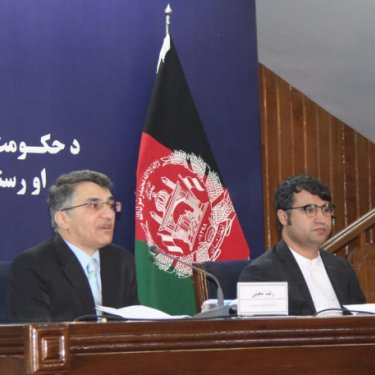“No just and lasting peace in Afghanistan without guarantees for press freedom”

Guaranteeing press freedom is essential for a just and lasting peace in Afghanistan, two press freedom organizations – Reporters Without Borders (RSF) and the Federation of Associations and Media in Afghanistan – said at a press conference in Kabul today.
In a joint statement, the two organizations urged the Afghan government and the Taliban to resume peace talks, and called on civil society, politicians and, in particular, candidates for the 28 September presidential election to back their campaign, which is entitled: “There will be no just and lasting peace without guarantees for press freedom.”
The two organizations believe that peace and peaceful coexistence will not be possible in Afghanistan without the entire society’s participation, and that this needs guarantees for a free and independent press. They therefore call on participants in the Afghan peace talks to:
• Do their utmost to ensure protection for press freedom and journalists, respecting the Islamic Republic of Afghanistan’s constitution and laws, and the international standards enshrined in the Universal Declaration of Human Rights and the International Covenant on Civil and Political Rights.
• Strengthen all the fundamental laws, decrees and institutions that, for the past 18 years, have guaranteed press freedom, the protection of journalists and, in particular, the rights of women journalists.
• Protect and reinforce the measures that the government of national union and the coordinating committee for the safety of journalists and media have taken to defend the freedom to inform. Reinforce the work of the sub-committees that have been created to monitor and respond to threats and abuses against journalists and media, and the work of the General Directorate for Analysing and Combatting Crime.
• Respect the rights of women journalists to work freely.
RSF and the Federation of Associations and Media in Afghanistan also call on the Taliban to explicitly undertake to respect international humanitarian law’s basic treaties, starting with the Geneva Conventions. An undertaking to this effect would be a guarantee for the safety of journalists.
Media personnel have paid a heavy price in Afghanistan since 2001. At least 70 media workers, including 16 foreign journalists, have been killed in connection with the provision of news and information, More than 40 media outlets have been attacked and destroyed during the same period, while hundreds of threats against journalists and media outlets have been reported.
Afghanistan is ranked 121st out of 180 countries in RSF’s 2019 World Press Freedom Index.



